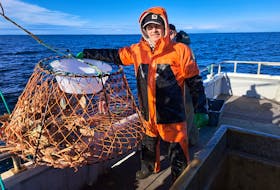The fishery should be renewable; the oil industry clearly is not.
So, if actions we’re taking to support the oil industry could be affecting the fishing industry, we clearly should be investing the time and effort to understand the possible implications instead of simply moving forward.
There have always been questions about the damage that oil industry seismic work might be doing on marine organisms — yet off this province, seismic work has not only grown, but has occasionally been taken on and paid for by provincially owned Nalcor Energy.
It’s practically become a point of pride for the government, which has boasted about seismic programs being the largest undertaken, and even as being unrivalled in the modern exploration era.
But there are questions about whether the testing might be damaging something as basic as plankton — the basic food source at the bottom of the oceanic food web. In other words, the food that most marine species depend on.
But fisheries science is supposed to be based on the precautionary principle.
The testing is done by the use of compressed-air blasts that are loud enough to travel down through water and the ocean floor to locate potential oil and gas fields — seismic vessels fire the compressed air guns every few seconds and then gather information on how the sound is reflected back to sensor arrays towed behind the vessels.
But a study in the journal Nature — Ecology and Evolution from June of 2017 raises some interesting questions.
This is from the study’s abstract: “Experimental air gun signal exposure decreased zooplankton abundance when compared with controls … and caused a two- to threefold increase in dead adult and larval zooplankton. Impacts were observed out to the maximum 1.2 km range sampled, which was more than two orders of magnitude greater than the previously assumed impact range of 10 (metres). Although no adult krill were present, all larval krill were killed after air gun passage. There is a significant and unacknowledged potential for ocean ecosystem function and productivity to be negatively impacted by present seismic technology.”
Couple that with something else: as the volume of seismic work has increased — maps of the work show vast areas of ocean crossed and crisscrossed with the vessels’ tracks — oceanic plankton levels off Newfoundland and Labrador have declined dramatically.
In fact, the plankton abundance numbers have dropped over the last five years by as much as 50 per cent.
There could be a myriad of reasons for the drop; the continuing acidification of the oceans might be affecting the ability of plankton that use calcium to hold their structure to survive. Rapid temperature change might also be affecting their ability to survive.
But fisheries science is supposed to be based on the precautionary principle.
Perhaps we should be looking at more research, rather than trumpeting more seismic work.

![['Joe Gibbons/The Telegram<br />The Nalcor-sponsored EM Leader moored in St. John’s harbour Thursday.']](https://saltwire.imgix.net/seismic-ships-2882906.jpg?cs=srgb&fit=crop&h=568&w=847&dpr=1&auto=enhance%2Cformat%2Ccompress)







